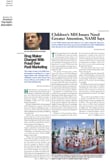I am writing as a concerned resident soon to transition into practice regarding a poor public-relations indicator in a 2003 Gallup poll showing that for all the professions listed, only 38 percent of the public gave top ranking to psychiatrists for their honesty and ethics, compared with 68 percent for physicians as a group.
The survey, administered yearly by the Gallup organization, asks the public to rank a list of professionals in terms of their honesty and ethics. The 2003 survey was different from previous polls in that Gallup listed psychiatrists separately from physicians as a group. Psychiatry was the only specialty to be singled out, which by itself is concerning.
The poll results concerned me even more after American Medical News printed an item in its February 2 issue that hailed the results as a success for U.S. physicians because physicians, who were ranked second,“ garnered [their] highest percentage ever.” (Nurses ranked first, at 83 percent.)
Concerned with the number of other publications that might report on the poll, I contacted the Gallup organization. A secretary recommended that I contact the editors directly, which I tried to do but was unsuccessful.
When I mentioned the poll results to other residents and psychiatrists, they seemed to accept the findings as accurate. Their resignation made me question how effective we are in reducing the stigma affecting our patients when we cannot reduce its impact on our profession and when we accept it as a given.
I had a few other thoughts about the poll results:
•
The poll probably reflects the stigma of mental illness, and our failure to respond confirms our acceptance of it.
•
The results may also reflect flawed methodology. Our failure to point this out threatens our credibility and thus our ability to lobby for our patients.
•
If the poll accurately captures people's perception of psychiatrists, APA might want to address the reasons behind it.
After sharing my frustration with my supervisor/mentor, Dr. Richard Balon, he suggested that I write a letter to APA's leadership. I was pleased with the quick reaction of the Board of Trustees, outgoing APA President Marcia Goin, M.D., and incoming APA President Michelle Riba, M.D.; they not only shared my concerns about the poll results, but they also began to look into ways to address them and prepare a response.
What this issue uncovers is the tremendous need for APA to improve the ways in which we advance our message and image and help our allied organizations with their efforts to educate the public about mental illness. Doing so will have a synergistic effect on our political lobbying efforts. Funding could come from concerned psychiatrists much in the same way as we support APAPAC. In addition, APA might want to commission its own survey along the same lines as the current Gallup poll but one whose methodology is beyond question.
For the good of all who suffer from mental illness, I hope APA will continue to take matters related to our public image seriously.
